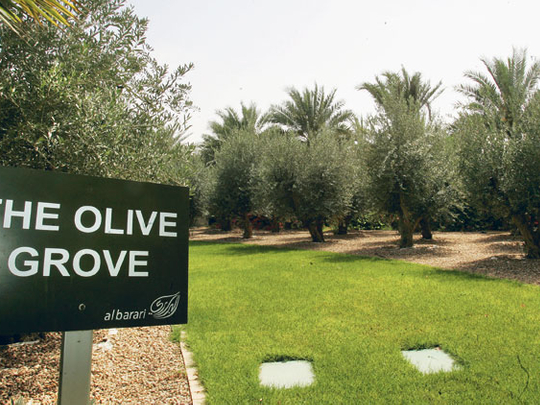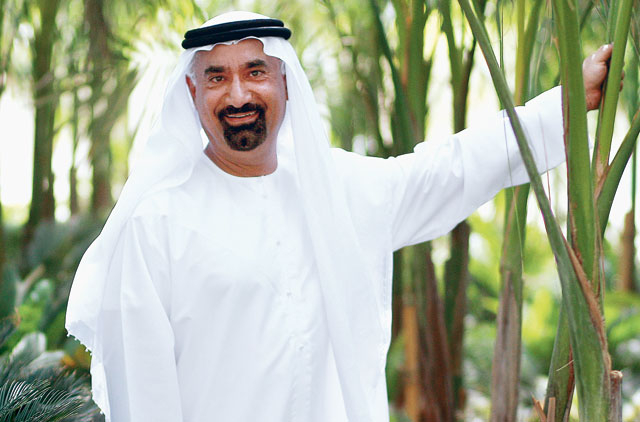
Dubai: Dubai's baking summer is here. A few days more and the thermometer will record searing temperatures, with the mercury soaring above 45° Celsius.
Nothing unusual about that in a desert city, except that an Emirati father-and-daughter duo think they can make noonday temperatures feel like a walk in the park. Backed by a plant nursery — the size of 33 football fields (15 hectares) — and employing over 100 horticulturists, the exclusive Al Barari development off Emirates Road seeks to create a "micro-climate" in the desert by planting millions of trees, shrubs and flowers.
The 130-hectare Al Barari deve-lopment started off as a garden. It still is, with 80 per cent of the area allocated for greenery around the 247 villas, of which more than 20 have been handed over.
Greenworks, Al Barari's nur-sery, holds about one million plants at any given time to supply the development. "Our aim is to plant a tree, a shrub, bush and flowering plants at every opportunity [within the development] and create a micro-climate here," said British-educated Emirati, Kamelia Bin Zaal, Al Barari's Chief Landscape Designer.
Love and care
Kamelia and her father, Dubai entrepreneur Zaal Mohammad Bin Zaal, are behind this exclusive Dubai township, where the cheapest villa costs Dh17 million. "It's not difficult at all to grow plants. You can grow anything from cuttings and propagation. With water and the right soil, there's no secret to growing plants — it's just TLC [tender, loving care]," said Kamelia.
But how much water is enough for these plants, especially the imported species?
According to Kamelia, "As the project is still in progress, there is no accurate measurement. Once the gardens are established and the ground cover matures, there will be less evaporation and, therefore, less water requirement. The aim is to make the gardens as sustainable as possible — minimum use of water for maximum greenness," said Kamelia, adding that she expects a substantial drop in temperatures under the canopy of greenery.
Just off exit 14 on Emirates Roads in the royal enclave of Nad Al Sheba, Al Barari looks like a Shangri-La of sorts. The owners have installed a reverse osmosis plant to clean the water used in the waterways and reuse sewage water.
Greenworks, a virtual assembly plant for plants, has greenhouses, shaded areas made of plastic netting and a 5,000 square-metre facility for composting and mulch production. The place is undergoing a Dh2.2 million expansion.
Several olive trees — valued in the region as a symbol of abundance and steadfastness — have been moved to Al Barari's Mediterranean garden, one of its six themed botanical areas.
Thousands more olive seedlings from cuttings have been acclimatised to UAE's weather conditions. The big ones — the six 1,000-year-old olive trees imported from Jordan — sit outside a greenhouse waiting to be moved to the property.
Millennium-old trees
Kamelia declined to give the price of the millennium-old olive trees, but private nurseries in Warsan sell 10-year-old ones for up to Dh6,000 each.
Most nurseries in Dubai, including Greenworks, import plants.
As a rule, Dubai nurseries must obtain a technical licence to import plants, said Ahmad Mohammad Abdul Karim, Director of Public Parks and Horticulture Department at Dubai Municipality. They must also obtain an import permit from the Ministry of Agriculture and Water to ensure that the Convention on International Trade in Endangered Species of Wild Fauna and Flora, which includes 2,800 plant species, is not violated. The agreement does not ban trade per se, but regulates it subject to laws and trade permits.
But importing is the easy part. Imports from non-arid countries easily wilt if they don't go through an acclimatisation process, which is the hard part. Jaafar, a horticulturist at Abu Hamali Nursery in Warsan, sells a mix of imports and locally-grown plants.
Imported plants need to be toughened, he said. "It is a lengthy process but that's the only way to do it," said Jaafar.
Greenworks only produces for Al Barari — their botanists also carry out research under optimal soil and water conditions for each plant variety to ensure that every species is suited to the local environment.
Training for survival
Kamelia said she brought around 200 plant species from different parts of the world to the country for first time and "trained" them to adapt to the UAE environment. The list of these plants is one of Kamelia's closely-guarded secrets.
"Plants go into a ‘shock' during transportation — and when they are taken out of their containers," she said. After delivery, they are first taken to a climate-controlled greenhouse and then to a net-covered "half-way" house. After weeks or months of acclimatisation, they are moved to an open field for further toughening.
If the benefits of greening are intangible, why spend so much money on it?
"Because plants attract and support life," said Kamelia.
Plants absorb carbon dioxide and produce oxygen and are the reason why the earth is different from its uninhabitable neighbouring planets, she said.
"We want to build a space where my family would want to live in," she added.
Greenworks nursery
- The 15-hectare Greenworks nursery at Al Barari is undergoing expansion to approximately 18 hectares — the largest, privately-owned nursery in the region
- It was established in 2006 to supply millions of plants for the Al Barari development
- It can hold up to one million plants at a time, together with research space, propagation areas and a dedicated on-site composting and green-waste recycling facility
- It grows or nurtures over 200 species of plants that have never been grown in the region, including species from Jordan, Thailand, China, Italy, Holland, Britain, Singapore, Malaysia, Australia and South Africa
- The nursery propagates its own plants, especially native varieties — over 2.6 million trees, shrubs and ground covers each year
- More than 60 per cent of the plants are propagated within the nursery from cuttings
- The nursery houses a special acclimatisation facility for exotic plants and a collection of olive trees that are over 1,000 years old
- It has a dedicated plant-waste recycling facility to produce mulch (for ground cover, water retention)
- It has its own horticultural research laboratory to identify optimum growing conditions for each plant variety
- More than 1,800 species of plants from over 20 countries have been researched at the nursery
Climate Control
"Micro-climate" was first used in horticultural lingo in 1925. It means climate variations in a given area influenced by hills, hollows, structures or proximity to water bodies.
Dr Seifu Bekele of Melbourne-based Vipac Engineering, which conducts greening and wind analysis, studied Dubai's micro-climate using an infrared camera. He said a desert micro-climate is possible and cost-effective in the long-run as plants purify air and cool surroundings. The results, presented in 2008 at a conference in Dubai, revealed that in June 2007, the temperature of a tree canopy on Mankhool Road at 11.25am was 42°C, 14°C less than an exposed pavement's temperature of 56°C. At 8:50pm, the tree temperature (31°C) was higher than the pavement's (28°C).
"Temperature measurement of trees and pavement at daytime and in the evening in Dubai shows a high temperature gradient, which initiate heat transfer between the two," Bekele said. As daytime temperature reduces, it lowers the "heat-island" effect, an unintended consequence of urbanisation. So buildings need less cooling.
Other players
- Dubai has around 20 licensed nurseries, which were moved from Garhoud to Warsan
- The National Horticultural Co in Sweihan, Abu Dhabi, uses glass houses to grow 16 varieties of roses in a seven-hectare farm as well as vegetables and fruits like egg plants, lady's finger, tomatoes and sweet melon
- Abu Dhabi's Mirak Farms grows roses, ornamental plants, vegetables and strawberries and exports them to Japan and Hong Kong
- Plants Horticulture, a 30-year-old Dubai firm, offers indoor tropical rainforest landscaping. The firm has an import quota of three tonnes of plants per week and has put together Sharjah Botanical Museum













